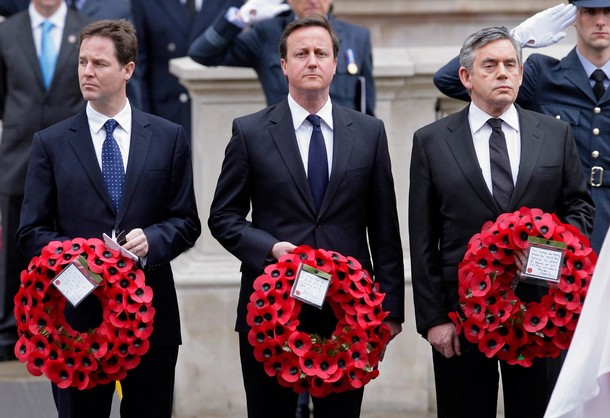Britain’s Hung Politics: The Death Throes of Parliamentary Democracy
Finian Cunningham | 11.05.2010 15:06 | Analysis | Repression | World
Not on the agenda of discussions to form the next British government are issues such as shifting the burden of taxation on to the wealthy so as to fund badly needed public services and job creation; or bringing the financial oligarchy under democratic control by nationalising banks; or immediate cessation of British involvement with the US and other NATO forces in criminal wars being waged in three foreign countries – Afghanistan, Iraq and Pakistan.

Clegg, Cameron and Brown marking the Victory in Europe Day, 8 May 2010
This is reflected in over one-third of the electorate abstaining from voting on 6 May and none of the parties receiving any decisive support – resulting in a “hung parliament” where no one party can form a government. This unfortunate phrase could serve as an altogether more foreboding metaphor for the condition of British parliamentary democracy and western democracy in general.
Britain’s outgoing Labour prime minister Gordon Brown inadvertently said it all on 10 May in a speech revealing his resignation. “The reason that we have a hung parliament is that no single party and no single leader was able to win the full support of the country,” he said (emphasis added).
Set against this widespread disillusionment among the electorate is the fact that all the parties have nothing progressive to offer in terms of addressing the worst economic crisis since the 1930s. All parties are agreed – although they were careful not to say it too loudly in the run-up to the election – that the only possible way of dealing with Britain’s soaring budget deficit is through massive public spending cuts. Given this bleak manifesto, no wonder voters showed such reluctance. It’s tantamount to asking turkeys to vote for Christmas.
Throughout the history of British parliamentary democracy, as elsewhere in the world, it could be argued that the extent of real “people power” was always a limited discretionary right that was ultimately subordinate to the over-riding interests of the ruling class.
But what has become more apparent from this latest British non-election is that the choice people make on their ballot sheets now pointedly has no bearing whatsoever on how they are to be governed.
Tellingly, this is a trend that is seen elsewhere in Europe and North America. Governments and parties of all political shades, whether red or blue, left or right, are falling over themselves to implement austerity budgets that will hit the mass of ordinary people hardest. Job cuts, wage cuts, social welfare cuts, public service cuts now form an unquestioned consensus among mainstream political parties. All have declared, in effect, that the imperative is to placate the financial oligarchy with trillion-dollar bailouts, thus enriching this elite further while deepening the misery of the majority.
Adding insult to injury is the fact that it was the plundering of wealth by the transnational financial oligarchy that trigged the global economic crisis in the first place.
In Britain, the collapse of party politics into a malleable amalgam willing to do the bidding of the financial oligarchy is underscored by the petty horse-trading now being played out to form a coalition government. The Conservative party, which won the most votes, is trying to woo the minority Liberal Democrats to form a “conservative coalition”. Meanwhile, the Lib Dems are also in talks with the second-biggest Labour party to form a “progressive coalition”. In other words, despite the adjectives, any distinction between these parties and their coalitions is meaningless.
Not on the agenda of discussions to form the next British government are issues such as shifting the burden of taxation on to the wealthy so as to fund badly needed public services and job creation; or bringing the financial oligarchy under democratic control by nationalising banks; or immediate cessation of British involvement with the US and other NATO forces in criminal wars being waged in three foreign countries – Afghanistan, Iraq and Pakistan. Another 14 people killed this week in a drone attack in Pakistan, adding to hundreds of civilians already murdered, apparently doesn’t even intrude on the talks about future British government.
Instead, it seems, the “lynchpin issue” determining the formation of the next British government are banal reforms of the electoral system being discussed by the three parties – whether to introduce proportional representation or fixed-term parliaments. This is like playing parlour games while the house is burning.
The wider significance of the moribund state of British politics is that, as the Greek debt crisis shows, fiscal austerity, hardship and poverty is the price that the majority of people will pay for bailing out the financial oligarchy – no matter who you vote for. It’s not so much a hung parliament as “hung democracy”.
Sooner rather than later, the mass of people in Britain, as in other countries, will have to realise that they need to mobilise a new form of politics that defends and extends their social and economic interests. And this mobilisation evidently needs to be outside of the confines of the monochrome mainstream parties.
* Finian Cunningham is a journalist and musician www.myspace.com/finiancunninghammusic
Finian Cunningham
 e-mail:
finian.cunningham@gmail.com
e-mail:
finian.cunningham@gmail.com
 Homepage:
http://www.globalresearch.ca/index.php?context=va&aid=19101
Homepage:
http://www.globalresearch.ca/index.php?context=va&aid=19101
Comments
Display the following 4 comments